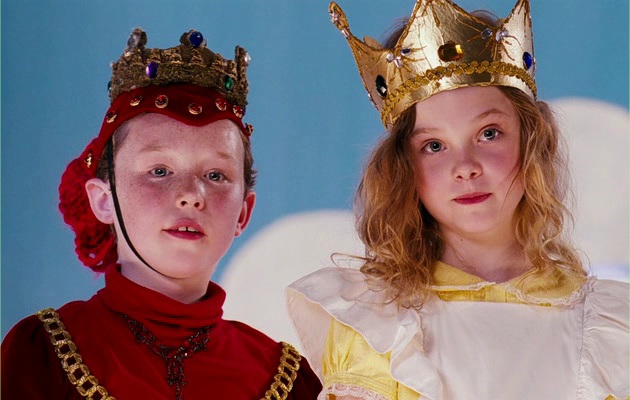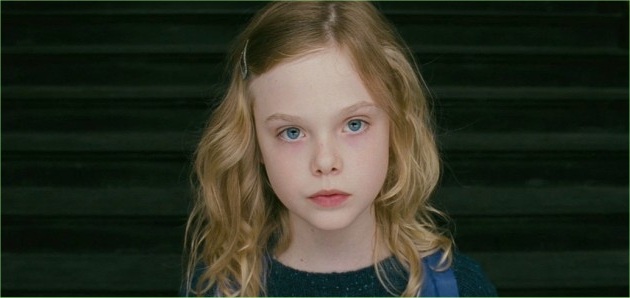Our Community Platform providing Essential Information to Know what is Real
Phoebe in Wonderland

Special Children Have Special Needs
Miss Dodger, the drama teacher supervising the elementary school players doing "Alice in Wonderland," described her Alice, Phoebe Lichton, as "a very special child." She was right. Phoebe, played by
 Elle Fanning, was Miss Dodger's star, and the perceptive instructor, portrayed by Patricia Clarkson, discovered the buried rays of her creative light emoting from beneath the veil of Phoebe's increasingly odd behavior. Oddly, Miss Dodger is the one person who did not notice that behavior. She only saw Phoebe's creative side, and successfully brought that talent to the fore of her fractured ego.
Elle Fanning, was Miss Dodger's star, and the perceptive instructor, portrayed by Patricia Clarkson, discovered the buried rays of her creative light emoting from beneath the veil of Phoebe's increasingly odd behavior. Oddly, Miss Dodger is the one person who did not notice that behavior. She only saw Phoebe's creative side, and successfully brought that talent to the fore of her fractured ego.
Special needs, fractured ego: What am I talking about? Well, I am talking about the theme of this film - an intelligent child deals with the inner demon of undiagnosed Tourette's Syndrome, and its frequent accompanying symptoms: Obsessive Compulsive Disorder (OCD) and Self Injurious Behavior (SIB).
Phoebe does not know that she has an incurable condition. She can only struggle to understand her symptoms as exemplified by her statement, "It's a voice in your head that makes you do the opposite of what you're supposed to. It makes you break rules."
Breaking rules for Phoebe: spitting at verbally abusive children, repetitive, indiscrete rhyming of verse that is often offensive, the obsessive-compulsive washing of hands, the numerically inspired
 clapping of hands and stepping, and the self-physical abuse of her person. Even the constant visions of the fantastic scenes from her "Alice in Wonderland" fixation is either the vivid imagination of a ten year old, or pre-diagnosed schizophrenia, which doesn't usually reveal its symptoms until one is a young adult. Elle Fanning, as Phoebe, does an excellent job of manifesting a child's distraught confusion at being so different from the other children and the way she was.
clapping of hands and stepping, and the self-physical abuse of her person. Even the constant visions of the fantastic scenes from her "Alice in Wonderland" fixation is either the vivid imagination of a ten year old, or pre-diagnosed schizophrenia, which doesn't usually reveal its symptoms until one is a young adult. Elle Fanning, as Phoebe, does an excellent job of manifesting a child's distraught confusion at being so different from the other children and the way she was.
The only situation where Phoebe feels secure is when she is able to unleash her complex imagination as a young thespian in Miss Dodger's play, as she headlines in her comfortable role as Alice. Miss Dodger, portrayed in complete empathy by Actress Clarkson, is an exceptional instructor as exhibited in her caring words to Phoebe, "At a certain part in your life. Probably when too much of it has gone by. You will open your eyes and see yourself for who you are. Especially for everything that made you so different from all the awful normals. And you will say to yourself, 'But I am this person.' And in that statement, that correction, there will be a kind of love."


Phoebe's parents are another matter. It is not that they are bad parents they're not. The mother, Hillary, played by Felicity Huffman, is a might self-absorbed. She complains that she can't complete her book on Charles Dodgson / Lewis Carroll's "Alice in Wonderland," and hints that she blames her husband, Peter, played by Bill Pullman, for her failure. She also bemoans the fact that her failing as an author has influenced her inability to properly mother her needful child, and completely dismisses the psychiatrist, played by Peter Gerety, that successfully diagnosed her child's condition. Huffman's Hillary Lichton is so pathetic, she makes you wish that someone, preferably her husband, would just shake her to gain her attention away from what she can not control, and stress to her the importance of listening to the doctor, and remind her that "Alice in Wonderland" has been written already. Hillary is a fine example of some highly educated people being educated way beyond their level of comprehension.


Hillary's husband is a fine example of a man surrounded by two daughters and an overindulgent wife to herself and to a lesser extent, Phoebe. If ever there was a time when the head of the household pulls rank over the self-absorbed wife, this is it. He does not take control and the family, and in particular Phoebe, suffers. Bill Pullman effectively fleshes out the unassertive father and makes him understandable, but not forgivable.

If you believe, this film is about the imaginative mind of a child, to the exclusion of her undiagnosed dysfunctional ego, that influences her to exhibit her creative instincts as a young thespian, you are mistaken. If there is any message from "Phoebe in Wonderland," it is that an undiagnosed mental dysfunction in a child is serious. The backdrop of the children's play is an excellent foil to the resolution of such a serious issue. Director and Screenwriter Daniel Barnz does a good job tackling this tough issue and keeping it pithy in 96 minutes of runtime.

The issue that this film being a good one is my subjective opinion. I have decided 3 1/4 stars are in order, but be warned, this is a serious subject and a serious film. Put the young children to bed before you settle in for this one, irrespective of the "Alice in Wonderland" correlation.
Rated PG13. Released on DVD June 23, 2009.






















